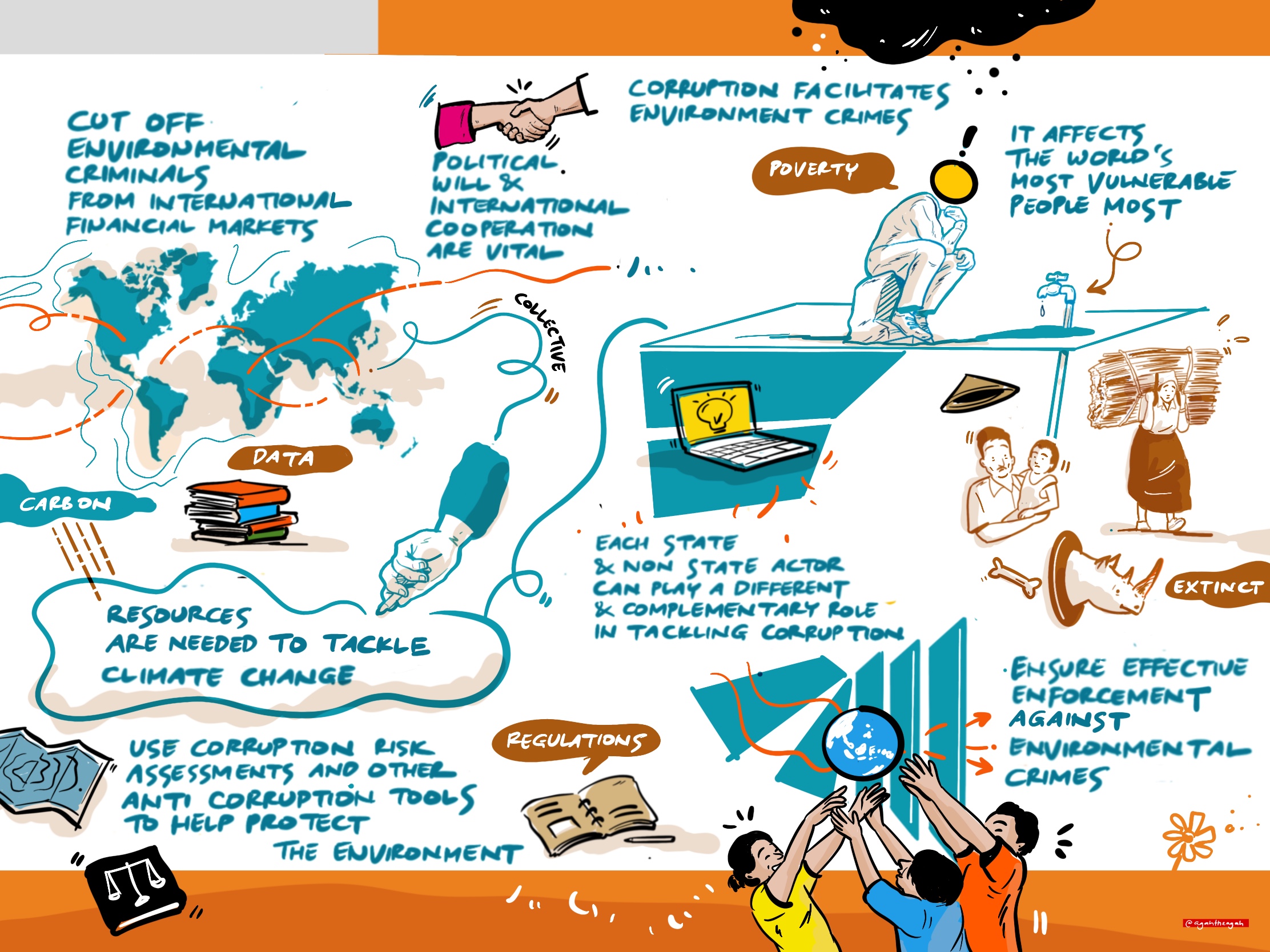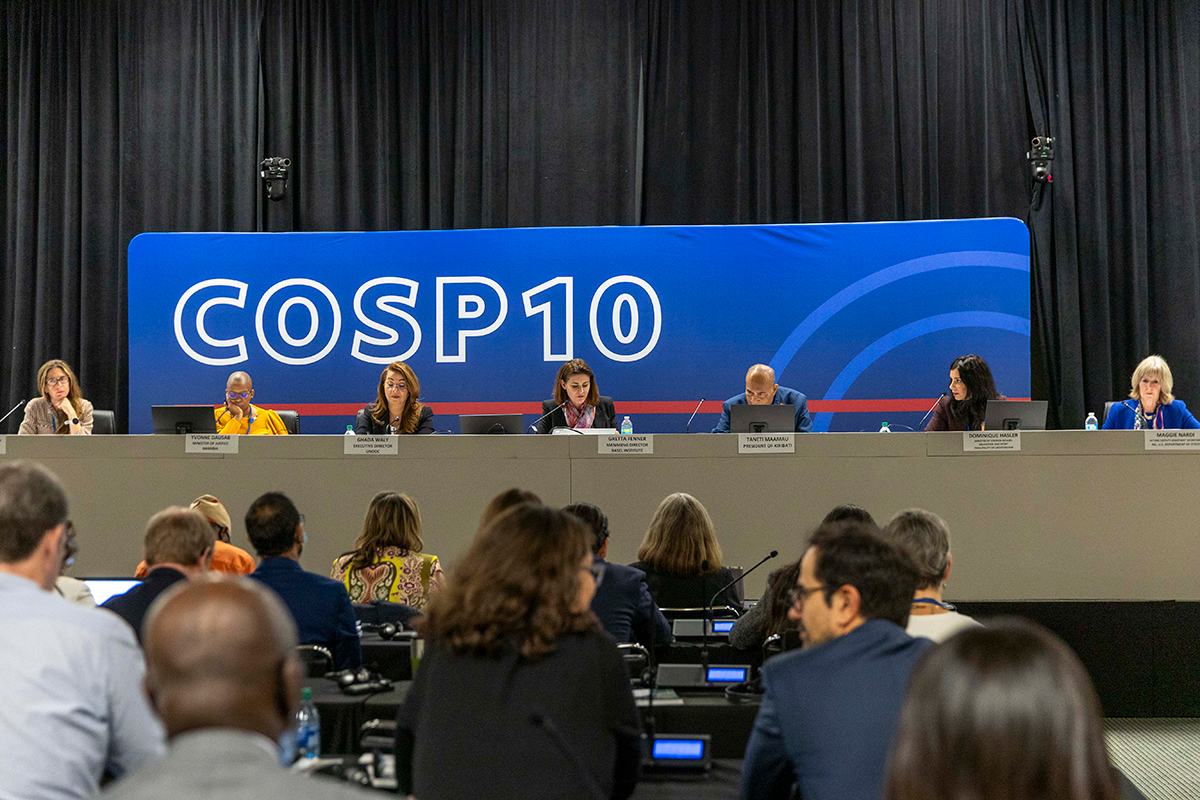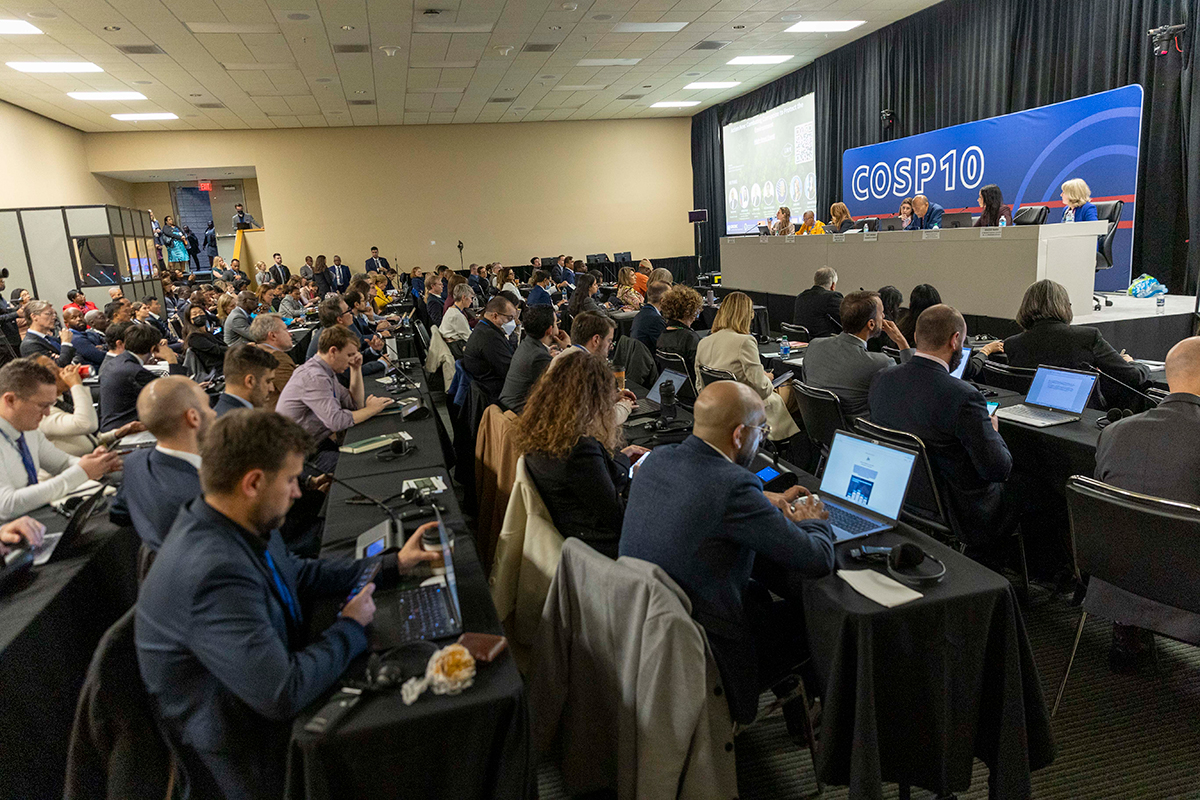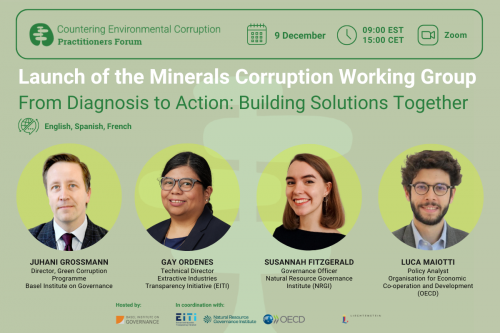Combating corruption to protect the environment attracts high-level support
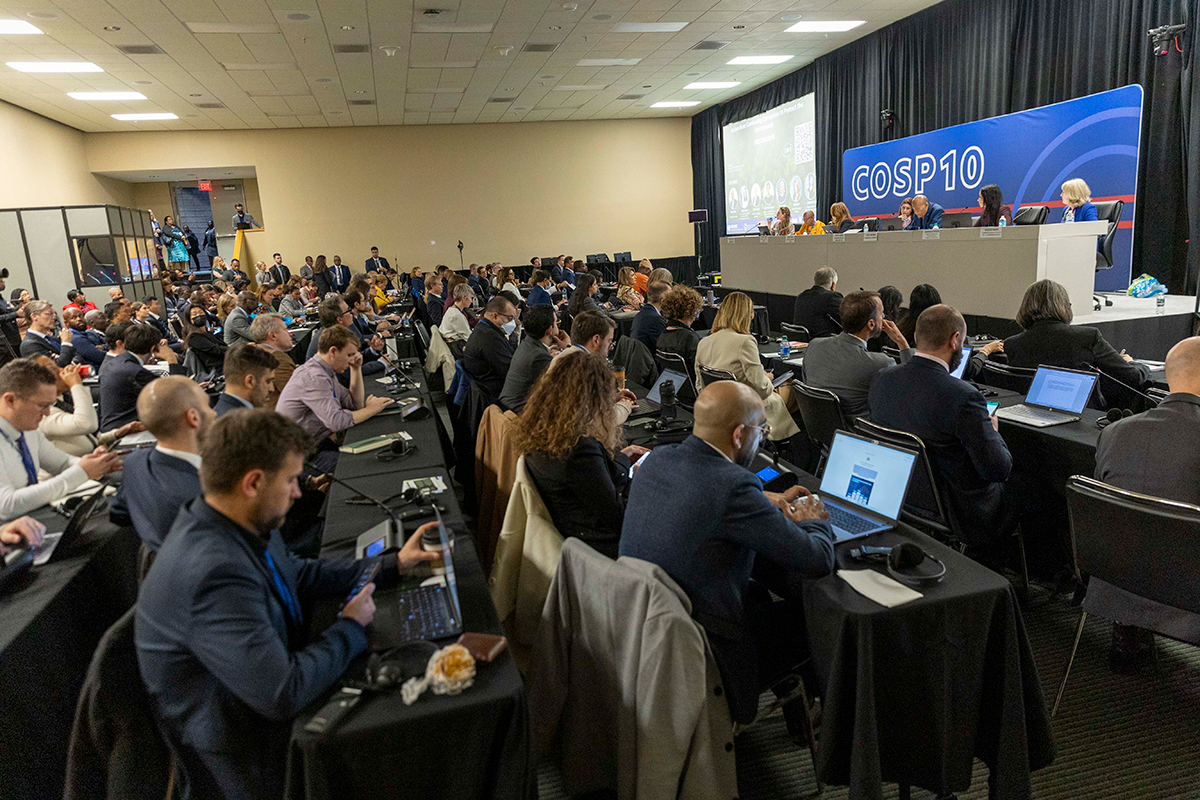
Have we reached a turning point in the fight against corruption that impacts the environment?
For the first time in its 20-year history, the Conference of the States Parties to the UNCAC (CoSP10) hosted a series of special events on corruption that impacts the environment. The 25 co-organisers included states, international organisations and non-profit organisations, including the Basel Institute on Governance through our Green Corruption programme.
The packed rooms showed the explosion of attention to corruption and the environment since the 8th CoSP in 2019, when Resolution 8/12 on Preventing and combating corruption as it relates to crimes that have an impact on the environment was passed. Some of the positive actions that states and non-state actors have taken in the last four years are set out in our report Seedlings of hope, which UNODC Executive Director Ghada Waly highlighted during the event.
Moderated by our Managing Director Gretta Fenner, the discussion featured high-level speakers representing Angola, Kiribati, Namibia, the United States, the UN Office on Drugs and Crime and the UN Development Programme.
See the full playlist of special events on environmental corruption, including the high-level event summarised below and panel discussions on the links between corruption and environmental crime, forest loss and corruption, how corruption threatens critical minerals supply chains, and the Basel Institute-led session on good practices and opportunities in tackling corruption that harms our environment.
Impacts of corruption on the environment
Awareness is growing of how corruption facilitates environmental crimes – nature crimes such as illegal logging, mining, fishing and wildlife trade, as well as waste trafficking. But speakers highlighted the systemic, long-term negative impacts of environmental corruption as well.
“[Nature] crimes harm ecosystems. They deprive local economies of a way of life, they can reduce development opportunities, and they can degrade the efforts to conserve.”
- Maggie Nardi, Acting Deputy Assistant Secretary, INL Bureau, U.S. Department of State
Some of the worst effects are suffered by the world’s most vulnerable people. Small island states like Kiribati suffer not only the effects of climate change, but the destruction of biodiverse fishing areas crucial to local livelihoods.
“Our exclusive economic zone (EEZ) ... faces significant corruption risks that threaten sustainable development and worsen the impacts of climate change. The fisheries value chain is particularly vulnerable, with potential consequences including illegal fishing, over-fishing, habitat destruction and mislabelling of fish."
– Taneti Maamau, President of Kiribati
Meanwhile, desperately needed resources to tackle climate change are being diverted.
“We need to spend at least USD 3.4 billion a year by 2030 to prevent wide-scale climate catastrophe... so we cannot lose any resources to corruption, and we must ensure that funds reach their intended targets.”
– Ghada Waly, Executive Director, UNODC
We’re all in it together
Each state and non-state actor can play a different and complementary role in tackling corruption that impacts the environment, depending on their context and resources. The panel’s broad geographical scope provided a variety of examples.
Anti-corruption tools that help protect the environment
With a population of just over 130,000, Kiribati has become a leading global voice on climate change and on the need to connect anti-corruption policies with environmental goals for more effective governance of natural resources. The state includes environmental and climate change topics in the country’s anti-corruption strategy and conducts corruption risk assessments with the support of UNODC.
“Corruption risk assessments aim to systematically analyse corruption vulnerabilities [and] facilitate the identification of key areas susceptible to corruption, such as licensing, processing, monitoring, enforcement activities and revenue. By understanding these risks, Kiribati and other small island states can develop targeted anti-corruption measures tailored to the specific needs of the governance of exclusive economic zones.”
– Taneti Maamau, President of Kiribati
Cutting off environmental criminals from international financial markets
With its large financial centre, Liechtenstein is acting strongly to cut off its financial system to environmental criminals and to support financial investigations into criminal networks. The country is strengthening its domestic laws in line with international standards and has established, for example, a beneficial ownership register and an anonymous whistleblowing system.
"[Environmental] criminals and their networks grow stronger every day and we as a community have to grow stronger too… This is a whole of society effort. What we are facing are crimes that are transnational and that transcend the formal and informal sectors… People are more and more aware of how interconnected we are. We are all part of global supply chains. Financial flows, licit and illicit, are also global. This comes with responsibilities and opportunities to be part of the solution.”
– Dominique Hasler, Minister of Foreign Affairs, Education and Sport, Liechtenstein
Ensuring effective enforcement
Namibia’s experience with the Fishrot case (described in brief in the Seedlings of hope report) shows how a country with limited resources can investigate, prosecute and sanction corruption at the highest levels of government. According to Namibia’s Minister of Justice Yvonne Dausab, important factors in the successful investigation and prosecution of the case were:
- The independence of the prosecution team as guaranteed by the constitution;
- A strong role for civil society and the media, which has created a “heightened sense of consciousness on the part of Namibians [and] created almost ‘hawk eyes’ on those in positions of power”.
- The multistakeholder system, including a “task force consisting of various institutions and law enforcement agencies.”
Minister Dausab also highlighted the
"efficiency of our teams, the streamlined approach and the excellent international cooperation throughout the investigation and asset confiscation/preservation stages. It is a sterling example to the international community in how such cases should be dealt with."
Political will and international cooperation
The technical side of countering corruption that impacts the environment is one thing. But nothing happens without the kind of high-level political will demonstrated by the panel’s distinguished speakers.
That’s why we need to encourage and celebrate leadership that ensures laws and regulations are implemented in reality and that strategies are applied with full transparency and accountability.
Political will was key to Namibia’s Fishrot investigation, said Minister Dausab.
"Our President leads from the front....the political will [to combat corruption and protect natural resources] is there."
According to a recorded statement by Paula Francisco Coelho, Angola’s Secretary of State for Climate Change and Sustainable Development. Angola’s Government:
“strongly reaffirms its unwavering commitment to combating corruption, particularly within the environmental sector and particularly as it relates to wildlife crime.”
More political will is necessary to strengthen international cooperation and to address climate change comprehensively by tackling corruption. The speakers expressed hope that corruption would be very much on the agenda at the climate Conference of Parties or COP29 in Baku, Azerbaijan in November 2024.
Francine Pickup, Deputy Assistant Administrator, UNDP, summed up the feeling of speakers and participants about the possibilities for tackling corruption that impacts the environment and thereby fostering sustainable and equitable development for all:
“We can tackle corruption and successfully protect our environment. But we have to act now and we have to act together.”
Learn more
- View the full playlist of special events on environmental corruption at the CoSP10.
- Read Working Paper 50 by Sophie Lemaître: Seedlings of hope: Addressing corruption linked to crimes that impact the environment in line with UNCAC Resolution 8/12. The report covers the efforts of states and non-state actors to address corruption that impacts the environment in the last four years.
- Working at the intersection of corruption and the environment or climate change? Deepen your knowledge and partnerships by joining over 600 members of the Countering Environmental Corruption Practitioners Forum, a joint initiative of the Basel Institute on Governance, WWF, Transparency International and TRAFFIC.
- The Basel Institute will be present at the forthcoming UN Environment Assembly to speak about the convergence between nature crime and other serious crimes, including corruption. Delegates can attend the side event on Thursday 29 February 2024 at 18:30 local time.

